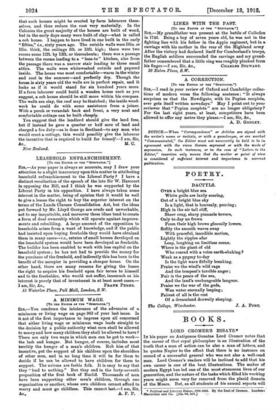LEASEHOLD ENFRANCHISEMENT.
[TO THE EDITOR OF THE "SPECTATOR."] Six,—As your paper is always so accurate, may I draw your attention to a slight inaccuracy upon this matter in attributing leasehold enfranchisement to the Liberal Party P I have a distinct recollection of the speech of the late Sir W. Harcourt in opposing the Bill, and I think he was supported by the Liberal Party in his opposition. I have always taken some interest in the matter, being of opinion that it would be well to give a lessee the right to buy the superior interest on the terms of the Lands Clauses Consolidation Act, but the ideas put forward by Mr. Lloyd George are crude and unworkable, not to say inequitable, and moreover these ideas tend to create a form of dual ownership which will operate against improve- ments and rebuilding. A large amount of the opposition to leaseholds arises from a want of knowledge, and if the public had insisted upon buying freeholds they would have obtained them in many cases—i.e., estates of small houses developed on the leasehold system would have been developed as freeholds. The builder has been enabled to work with less capital on the leasehold system ; he has not had to provide the money for the purchase of the freehold, and indirectly this has been to the benefit of the occupier in providing a cheaper house. On the other hand, there are many reasons for giving the lessee the right to acquire his freehold upon fair terms to himself and to the freeholder, who would not suffer, inasmuch as his interest is purely that of investment in at least most cases.—


























































 Previous page
Previous page